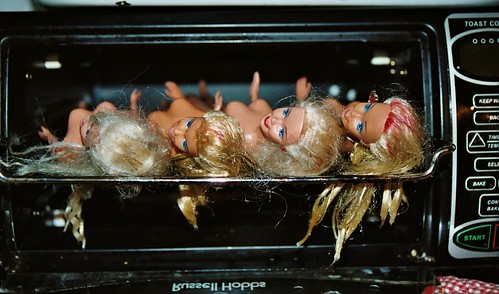
Having read Eliot Weinberger's 1983 essay, "The Bomb," in his classic
Works on Paper, published on New Directions, I started immediately looking online for more. There is an article in
Bomb Magazine, a conversation between Weinberger and poet Forrest Gander on why "they are confounded by the astounding absence of the role of poet as a public cautionary figure."
The essay "The Bomb" is a must, especially with these next few days seemingly everywhere devoted--from Facebook, to blogs, to poets' invitational emails--to the AWP Conference in Chicago. As early as 1983 Weinberger is pointing out the poet's "recently acquired status as a wage-earner" and its necessary complications involving literature in the affairs of the state (i.e., university chairs, federal grants, and the like).
Amiri Baraka, who took part in the (now-largely forgotten, I think) May 26, 1982 "Poets Against the End of the World" reading at NYC's Town Hall, thought that the long shadow of The Bomb would lead to "dynamic, socially relevant poetry" which, to Weinberger at that time, remained to be seen. Naturally, this hasn't come to pass, at least in the large-scale poetry "movements" of contemporary America, aside from small pockets here and there.
Political thought in poetry, aside perhaps from Marvin Bell's
Mars Being Red, is largely absent. After the Town Hall reading,
Poetry East quoted Maxine Kumin as saying "Poetry is too fragile an art for polemic" and this attitude has remained indelibly marked on the contemporary consciousness. But why?
Weinberger draws a distinction in the identity of the poet: that they are not
only poets, but also citizens (a thought Socrates would have appreciated) and, as far as writers go, capable of writing something other than poetry. Like essays, for example. Whether they recognize this is something else entirely. One would be hard pressed to find political poets of the caliber of Neruda today (forgiving him, and others, for their misguided rhetoric, all things considered) though you could find Vallejo's at a discount in any online publiction, wearing a political
sensibility on their sleeves, perhaps, but certainly not a solid
stance.Poetry, for all its pretensions to "gnosis," is rather a series of "communities of like souls in remote mountain fastnesses" and "communities addicted to whimsey, nostalgia, preciosity" according to Weinberger. It's hard not to quote at length from this essay of this contemporary poetic "longing for Dada or Surrealism" that results in most of the poetry published in the online journals from the aesthetic left consisting largely of "a talking in tongues" where "fleeting insights are netted and pinned to the page." But if today's poets were living, let alone understanding, a true gnosis they would realize the impact of Herakleitos: "You cannot hide from that which will not go away."
So what will not go away? Human suffering, war, poverty. The hysteria of anticommunism of Weinberger's time has been replaced by the hysteria of anti-terrorism, but where are the answers from our poets? As Weinberger suggests, (and correctly, particularly if one reads the plethora of "bios" on poets) today's American poets are entirely dependent on the military state. How many are feeding the university system, both with their tuition and their energy, whether as students or teachers? Poets have become, essentially, "wards of the state."
And this weekend they are gathering in droves to congratulate themselves in Chicago. To sell their books, to give their readings, to meet and shake hands and to drink, as one poet put it, "over-priced drinks." Like an island in the midst of a public that one poet once claimed to me "had no taste."
As Weinberger notes in a footnote, "a magnificent half-century of American poetry ended when the poets allowed themselves to be organized and controlled by the two traditional enemies of poetry: the university and the state."
(all quotes from Eliot Weinberger's
Works on Paper, published by New Directions Press in 1986; photo credit: Nina Subin)
 I’ll go ahead and confess that I’m not the greenest person out there. I recycle (mostly), I take public transportation when I can, and I even watched Al Gore’s movie (though I’ll confess to getting bored and turning it off about halfway through).
I’ll go ahead and confess that I’m not the greenest person out there. I recycle (mostly), I take public transportation when I can, and I even watched Al Gore’s movie (though I’ll confess to getting bored and turning it off about halfway through).










